Incholi is a village in the Meerut district [ Meerut district, is one of the districts in the Western side (Doaba area of Uttar Pradesh state of India, and Meerut is the district headquarters. Meerut district is also a part of the Meerut division.] of the Indian state of Uttar Pradesh. It is situated 13 kilometres from the city of Meerut, on Mawana Road, the main road that connects Meerut city to Bahsuma and 460 KM from state capital Lucknow.

Bhopal State was founded by Maharaja of Parmar Rajputs. In the beginning of 18th-century, Bhopal State was converted into an Islamic principality, in the invasion of the Afghan Mughal noble Dost Muhammad Khan. It was a tributary state within the Maratha Confederacy during 18th century (1737-1818), a princely salute state with 19-gun salute in a subsidiary alliance with British India from 1818 to 1947, and an independent state from 1947 to 1949. Islamnagar was founded and served as the State's first capital, which was later shifted to the city of Bhopal.

Joanna Nobilis Sombre, popularly known as Begum Samru, a convert Catholic Christian, started her career as a nautch (dancing) girl in 18th century India, and eventually became the ruler of Sardhana, a small principality near Meerut. She was the head of a professionally trained mercenary army, inherited from her European mercenary husband, Walter Reinhardt Sombre. This mercenary army consisted of Europeans and Indians. She is also regarded as the only Catholic ruler in Northern India, as she ruled the principality of Sardhana in 18th- and 19th-century India.
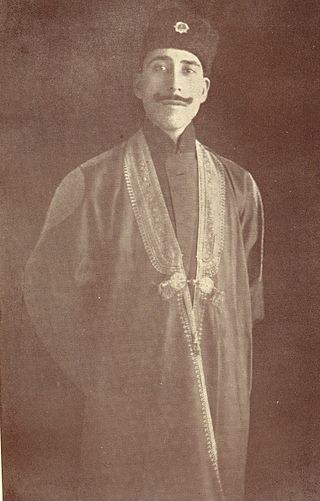
Sirdar Ikbal Ali Shah was an Indian-Afghan author and diplomat descended from the Sadaat of Paghman. Born and educated in India, he came to Britain as a young man to continue his education in Edinburgh, where he married a young Scotswoman.
Jalalabad (Jalālābād) is a town and a nagar panchayat in Shamli district in the Indian state of Uttar Pradesh. It is a historical town situated on Delhi Saharanpur road. Dating back to the Mughal period, situated close to the borders of Haryana and Uttarakhand states, and surrounded by a very fertile agricultural region namely famous for plentiful yields in grains and fruits, Jalalabad is internationally famous for its wood carving work cottage industry. It is a thriving market of local agricultural produce, including basmati rice and mangoes. A variety of agro-based industrial enterprises - such as textile, sugar, paper and cigarette factories - are located around it. It is 41 km from Saharanpur and 40 km from Muzaffarnagar.

The Nawab of Awadh or Nawab of Oudh was the title of the rulers of Kingdom of Awadh in northern India during the 18th and 19th centuries. The Nawabs of Awadh belonged to an Iranian dynasty of Sayyid origin from Nishapur, Iran. In 1724, Nawab Sa'adat Khan established the Kingdom of Awadh with their capital in Faizabad and Lucknow.

Mirza Aqil Hussain Barlas was a lawyer and diplomat, known for his translations from Persian. He was in charge of the Egyptian Embassy in New Delhi India.

Hindon River is an Indian river in that originates from the Shakumbhari devi range in Saharanpur district of Uttar Pradesh and falls into Yamuna river in Noida. Hindon is a tributary of Yamuna and is entirely rainfed, having an approximate catchment area of 7,083 square kilometres (2,735 sq mi).
Walter Reinhardt Sombre was a European adventurer and mercenary in India from the 1760s.
Nawab Qasim Jan was a courtier in the royal courts of Mughal Delhi. According to some sources he came from Yarkand and first lived in Lahore, attached to the court of the Governor Moin-ul-Mulk in the 1750s, thereafter he moved to Delhi and joined the Mughal court under emperor, Shah Alam II.
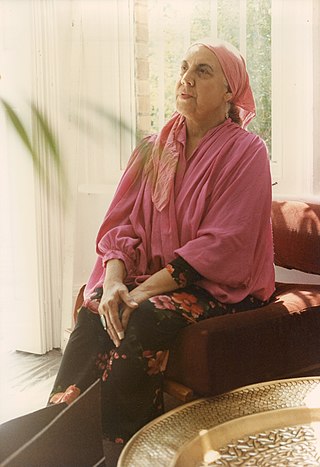
Amina Maxwell-Hudson was a British anthologiser of Sufi stories and folk tales, and was for many years the Chairperson of the College of Storytellers. She was the sister of the Sufi writers Idries Shah and Omar Ali-Shah, and the daughter of Sirdar Ikbal Ali Shah and Saira Elizabeth Luiza Shah, a Scottish woman. Her nephew is the travel writer and documentary filmmaker Tahir Shah; her nieces are Safia Shah and the writer and documentary filmmaker Saira Shah.
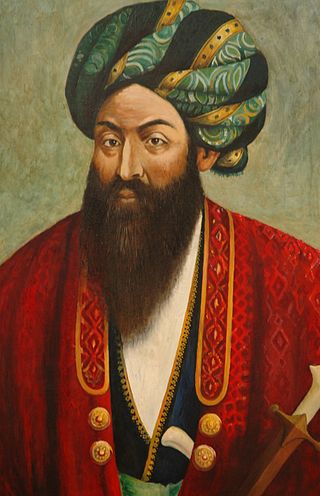
Saiyed Muhammed Shah, better known by his title as Jan-Fishan Khan, was a 19th-century Afghan noble chieftain (nawab) He participated in the First Anglo-Afghan War (1839–42) and the Indian Rebellion of 1857, and on both occasions, he supported the British. For his services to the British, Khan was granted the estate of Sardhana and is the forefather of the Nawabs of Sardhana.
Badshapur is one of the 4 sub-division of Gurugram district of Haryana state, situated on the Gurugram-Sohna road (NH-248A). It is named after the Badshahpur Fort, which in turn was the abode of the wife of Mughal Emperor Bahadur Shah Zafar.

David Ochterlony Dyce Sombre, also known as D. O. Dyce Sombre and David Dyce Sombre, was an Anglo-Indian politician reputed to be the first person of Indian descent to be elected to the British Parliament. He stood as a candidate in the constituency of Sudbury and became its MP in July 1841, but was removed from his seat in April 1842 after being found guilty of "gross, systematic and extensive bribery" during his campaign. He was named after the British Resident at Delhi, David Ochterlony.
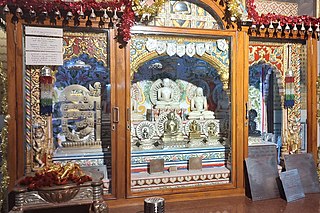
Jharsa is a village in Sector 39, Gurugram city of Gurugram district in Haryana State, India. It has a population of about 32,709; it is located 10 kilometres (6.2 mi) from the Gurugram city centre and 254 kilometres (158 mi) from the state's main city, Chandigarh. It is surrounded by Mohyal Colony, Patel Nagar, Kirti Nagar, Sectors 15, 31, 32, 39, 40, 46, and Indra Colony.

The Basilica of Our Lady of Graces is a Roman Catholic church in Sardhana, 19 km north-west of Meerut, in the Indian state of Uttar Pradesh.
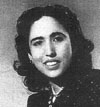
Aquila Berlas Kiani, also known as Aquila Kiani was a Professor of Sociology and an educator in social work. Born in British India, she later worked in Pakistan, the UK and the US. She served as Chairman of the Department of Sociology at the University of Karachi.

Sahiba Mahal was the second wife of Mughal emperor Muhammad Shah.
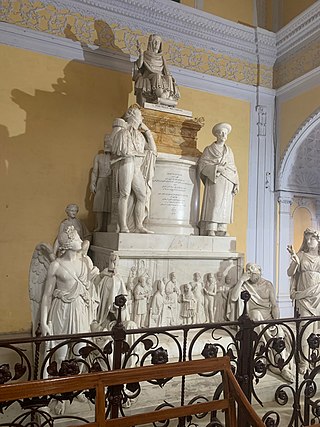
Adamo Tadolini was an Italian sculptor. One of a family of sculptors, he studied in Rome with the neo-classical sculptor Antonio Canova and is linked to him in style.
The Nawab of Sardhana is an honorary Muslim title bestowed upon the descendants of the Afghan noble chieftain (nawab) and statesman Jan-Fishan Khan, for services to the British Raj – both in the failed British Afghan campaigns, as well as during the 1857 Rebellion in India. The hereditary title was once accompanied by a large jagir at Sardhana, made up largely of ancestral lands which once belonging to the Begum Samru. While these lands have mostly now been dispensed of, the descendants of Jan Fishan Khan retain the right to use the title, Nawab of Sardhana.

















